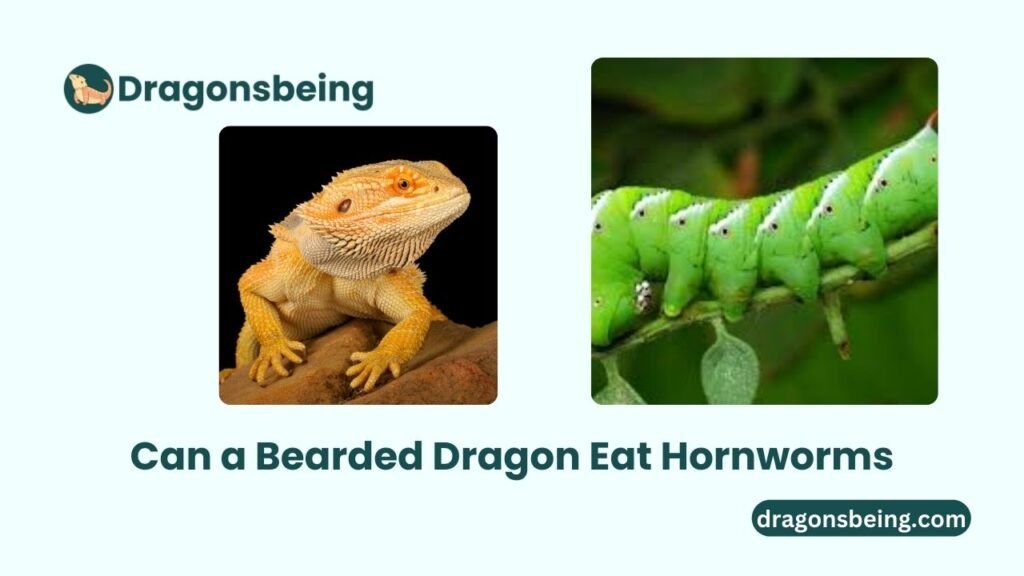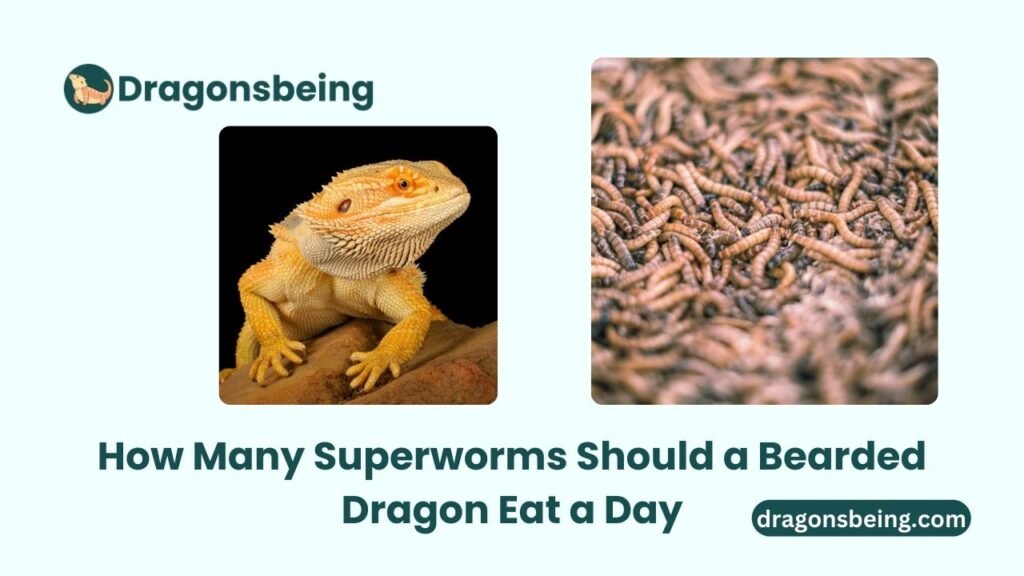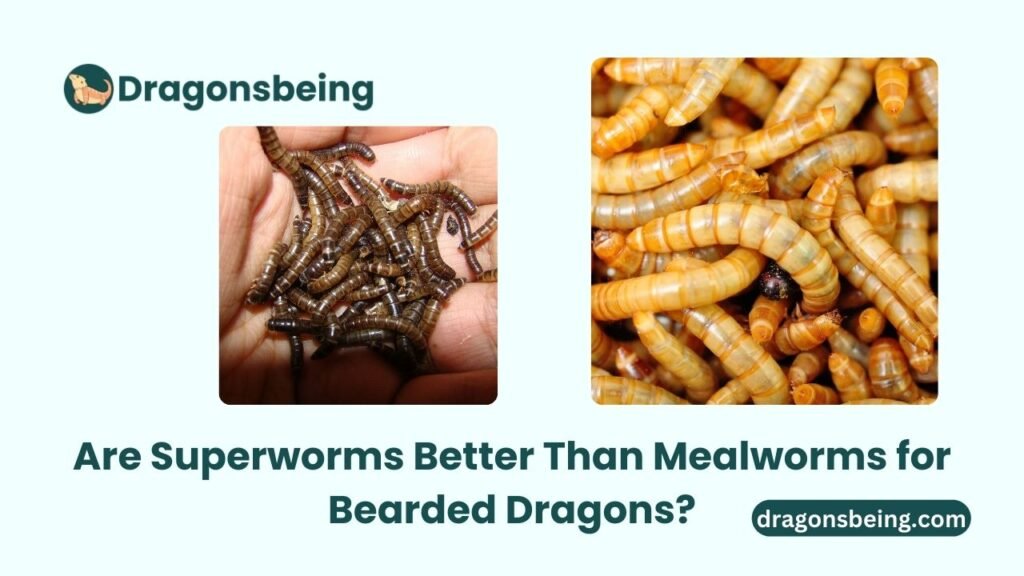Yes, bearded dragons can eat hornworms. These worms are a nutritious option and can be included in their diet.
Bearded dragons are popular pets known for their friendly nature and unique appearance. A balanced diet is crucial for their health and well-being.
Hornworms, specifically, provide a great source of hydration and protein. They are soft-bodied insects, making them easy for bearded dragons to consume.
Regularly feeding hornworms can help in growth and maintaining energy levels. It’s essential, though, to offer them in moderation, as too many can lead to obesity.
Understanding the dietary needs of your bearded dragon ensures they thrive and live a long, healthy life. Keep your pet’s diet varied for optimal health and happiness.
What Are Hornworms?
Hornworms are large, green caterpillars that belong to the moth family. They are popular as a food source for various pets, including bearded dragons. These worms are known for their high nutritional value and palatability.
The Biology Of Hornworms
Hornworms undergo several stages in their lifecycle:
- Egg: Laid by moths on plants.
- Larva: The caterpillar stage, which is what we feed to pets.
- Pupa: Transforms into a cocoon.
- Adult Moth: Emerges from the cocoon.
Here are some key facts about hornworms:
| Feature | Description |
|---|---|
| Size | Can grow up to 4 inches long |
| Color | Bright green with distinctive markings |
| Diet | Primarily feed on plant leaves |
| Habitat | Commonly found on tomato and tobacco plants |
Why Hornworms Are Considered For Pet Diets
Hornworms offer several benefits for pet diets:
- High in Protein: Essential for growth and energy.
- Moisture-Rich: Helps with hydration.
- Palatable: Most pets find them delicious.
- Nutrient Dense: Packed with vitamins and minerals.
Feeding hornworms to bearded dragons can support overall health. Their soft body makes them easy to digest. Many pet owners prefer them over other insects.
Nutritional Benefits Of Hornworms
Hornworms provide excellent nutrition for bearded dragons. These worms are soft, juicy, and full of essential nutrients. They can support your pet’s growth and health. Let’s explore their benefits in detail.
Vitamins And Minerals In Hornworms
Hornworms are rich in essential vitamins and minerals. Here’s a quick look at their key nutrients:
| Nutrient | Benefits |
|---|---|
| Vitamin A | Supports vision and immune function. |
| Calcium | Strengthens bones and prevents metabolic bone disease. |
| Phosphorus | Balances calcium levels in the body. |
| Vitamin B12 | Enhances energy metabolism and brain health. |
These nutrients help keep bearded dragons strong and active.
Moisture Content And Its Importance
Hornworms have a high moisture content. This is vital for hydration in your bearded dragon. Dehydration can lead to health issues.
- Hornworms are about 80% water.
- Hydration supports digestion and overall health.
- Helps maintain healthy skin and shedding.
Including hornworms in your pet’s diet can promote hydration. This keeps your bearded dragon happy and healthy.
Potential Risks And Considerations
Bearded dragons enjoy a varied diet. Hornworms can be a tasty treat. Yet, some risks exist. Understanding these risks helps keep your pet healthy.
Chitin Content And Digestion
Hornworms contain chitin, a tough substance in their exoskeletons. This can pose problems for bearded dragons.
- Chitin is hard to digest.
- Young dragons may struggle with it.
- Older dragons might manage better.
Excessive chitin can lead to:
- Digestive blockages
- Stomach discomfort
- Poor nutrient absorption
Risk Of Overfeeding
Hornworms are high in fat. Overfeeding can cause health issues.
Watch for these signs of overfeeding:
- Weight gain
- Lethargy
- Loss of appetite
Stick to these feeding guidelines:
| Age of Bearded Dragon | Hornworms per Week |
|---|---|
| Juvenile (0-6 months) | 2-3 Hornworms |
| Subadult (6-12 months) | 3-4 Hornworms |
| Adult (over 12 months) | 4-5 Hornworms |
Monitor your dragon’s health. Adjust their diet accordingly. A balanced diet keeps them happy and healthy.
Incorporating Hornworms Into A Bearded Dragon’s Diet
Hornworms are a popular food choice for bearded dragons. These worms are nutritious and help keep your pet healthy. They offer protein and moisture, making them an excellent addition to your dragon’s diet.
Frequency And Quantity
Feeding hornworms should be done wisely. Here are some guidelines:
- Young bearded dragons: 1-2 hornworms, 2-3 times a week.
- Adult bearded dragons: 3-4 hornworms, once a week.
Hornworms should not replace staple foods. Use them as a treat. Overfeeding can lead to obesity.
Live Feeding Vs. Pre-killed
Choosing between live and pre-killed hornworms impacts your dragon’s experience.
| Type | Benefits | Drawbacks |
|---|---|---|
| Live Hornworms |
|
|
| Pre-killed Hornworms |
|
|
Choose the option that works best for your bearded dragon. Always watch how your pet reacts to the food.
Preparing Hornworms For Your Bearded Dragon
Feeding hornworms to your bearded dragon can be exciting. These worms are nutritious and tasty. Proper preparation is key for your pet’s health. Follow these steps to ensure safe and effective feeding.
Safe Handling Practices
Always handle hornworms with care. They can be slippery and delicate. Here are some safe handling tips:
- Wash your hands before handling.
- Use gloves if you prefer.
- Gently pick them up by their body.
- Avoid squeezing or dropping them.
Keep hornworms away from sharp objects. This prevents injury to the worms. Always supervise your bearded dragon while eating.
Storage And Lifespan Of Hornworms
Proper storage keeps hornworms fresh. Here are some tips for storing them:
| Storage Method | Temperature | Lifespan |
|---|---|---|
| Refrigerator | 50-55°F (10-13°C) | 1-2 weeks |
| Room Temperature | 70-80°F (21-27°C) | 3-5 days |
Check hornworms daily for any signs of spoilage. Discard any that appear unhealthy. Fresh hornworms provide better nutrition for your bearded dragon.
Observing Your Bearded Dragon’s Response
Watching your bearded dragon eat hornworms is important. Their reactions reveal their health and well-being. You can learn a lot by closely observing them during feeding time.
Signs Of A Healthy Appetite
Healthy bearded dragons show clear signs of appetite. These signs indicate that they enjoy their food, including hornworms. Look for the following:
- Excitement at feeding time: They may bob their heads or run towards food.
- Active hunting: They chase and catch hornworms eagerly.
- Quick consumption: They eat hornworms without hesitation.
- Bright colors: Their skin appears vibrant and healthy.
Monitor their behavior closely. A healthy bearded dragon will show interest and enthusiasm. Keep a routine feeding schedule to help gauge their appetite.
When To Be Concerned
Sometimes, a bearded dragon may not respond well to hornworms. This can be a cause for concern. Watch for these signs:
- Lack of interest: They ignore the food or walk away.
- Slow movements: They seem lethargic or inactive.
- Weight loss: A noticeable decrease in body weight.
- Changes in feces: Unusual color or consistency.
Consult a vet if you notice any of these signs. Quick action helps keep your bearded dragon healthy. Regular observation can prevent serious issues.
| Sign | What It Means |
|---|---|
| Excitement | Healthy appetite |
| Lack of interest | Possible health issue |
| Bright colors | Good health |
| Weight loss | Need for vet visit |
Alternative Foods And Supplements
Bearded dragons enjoy a varied diet. Hornworms are one option, but other foods are important. Offering different foods helps keep them healthy. Variety prevents boredom and encourages eating. Let’s explore some options.
Balancing The Diet With Variety
A balanced diet includes insects, vegetables, and fruits. Here are some great alternatives:
- Insects: Crickets, mealworms, and dubia roaches.
- Vegetables: Collard greens, kale, and bell peppers.
- Fruits: Strawberries, blueberries, and mango.
Mix these foods throughout the week. This approach boosts nutrition. Remember, some foods should be offered in moderation. High-fat foods like mealworms should not be the main diet.
| Food Type | Examples | Frequency |
|---|---|---|
| Insects | Crickets, Dubia Roaches | 3-5 times a week |
| Vegetables | Kale, Carrots | Daily |
| Fruits | Mango, Berries | 1-2 times a week |
Supplements For Optimal Health
Supplements help ensure your bearded dragon gets enough nutrients. These are crucial for growth and health:
- Calcium Powder: Sprinkle on insects and veggies.
- Vitamin D3: Helps in calcium absorption.
- Multivitamin: Offer once a week for overall health.
Choosing the right supplements is key. Avoid over-supplementing. Follow the recommended guidelines. Always monitor your bearded dragon’s health and behavior.
Frequently Asked Questions
Can Bearded Dragons Eat Hornworms Safely?
Yes, bearded dragons can safely eat hornworms as a nutritious treat.
How Often Can I Feed Hornworms?
Hornworms should be given occasionally, about once a week.
What Nutrients Do Hornworms Provide?
Hornworms offer protein, moisture, and essential nutrients for bearded dragons.
Can Hornworms Cause Any Health Issues?
Overfeeding hornworms may lead to obesity or digestive problems.
Are Hornworms Better Than Other Insects?
Hornworms are high in moisture and protein, making them beneficial compared to some other insects.
Where Can I Buy Hornworms For My Pet?
Hornworms can be purchased online or at local pet stores.
Conclusion
Feeding hornworms to your bearded dragon can be a nutritious treat. These worms are rich in protein and moisture. Always ensure they are appropriately sized and fresh. Monitor your pet’s health and adjust their diet as needed. Providing variety in their meals keeps your bearded dragon happy and thriving.

Hi, I’m Dr. Michelle Mayers, a veterinary professional with a deep passion for animal health and well-being. Over the years, I’ve dedicated my life to caring for animals and helping pet owners better understand their furry, feathered, or scaly companions. On my blog, Dragonsbeing, I share insights, tips, and stories that aim to educate, inspire, and connect with fellow animal lovers. Join me at Dragonsbeing as we explore the fascinating world of veterinary care and celebrate the special bond between humans and animals!


